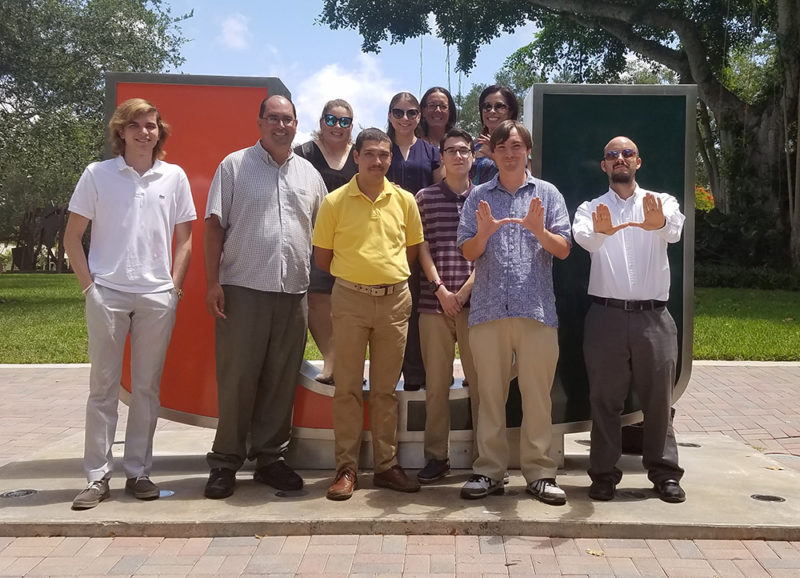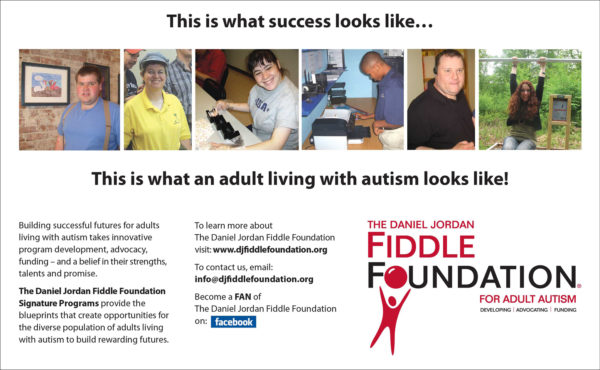The process of finding, applying for and obtaining employment is one that is constantly evolving. These changes often present new challenges for adolescents and adults with autism and related disabilities. For providers and clinicians, this means it is more important than ever to evaluate the success of community programming and make adjustments.
Project EAARN (Employment for Adults with Autism Resource Network) began in 2010 as an employment initiative at the University of Miami-Nova Southeastern Center for Autism Related Disabilities (UM-NSU CARD). Through The Daniel Jordan Fiddle Foundation Transition and Adult Programs at UM-NSU CARD, the initiative aims to improve employment outcomes for individuals with ASD. In 2013, Employment Boot Camp was introduced as a core concept that would provide one-week of intensive employment training focused on helping adults gain the skills needed to obtain and maintain employment.

Job SEEKers at the University of Miami-Nova Southeastern Center for Autism Related Disabilities
After offering Employment Boot Camps for 3 years, the facilitators recognized that the program’s structure needed to be adjusted to meet the needs of the participants. To start, community members pointed out that the name “Employment Boot Camp” could have a literal, and therefore negative, connotation which could deter potential participants. While the team at UM-NSU CARD agreed that using “boot camp” could be misleading, the feedback also prompted an evaluation of the program’s entire structure. Through their assessment, it became apparent that the week-long intensive program was not allowing clinicians or participants to make the most of the experience. From the clinicians’ standpoint, the week of all-day Employment Boot Camp was exhausting and didn’t allow time for homework assignments or thorough follow-up. Additionally, participants did not have time to reflect on the daily lessons and therefore weren’t able to discuss questions or challenges that arose throughout the week. These factors, along with other observations, prompted the program’s re-design.
The first two changes were simple and addressed the misleading name and intensive condensed format of the program. The team at UM-NSU CARD opted to name the program Job SEEKers (Seeking and Enhancing Employment Knowledge) and expand the format from one-week of intensive training to a once per week meeting over the course of 6 weeks. The changes allowed for additional areas of focus and hands-on instruction.
When developing the original curriculum, the team strategically selected the topics and skills to address in order to make the greatest impact for participants. Through the re-evaluation of the Boot Camp, it was apparent that original areas of focus were still relevant and necessary when addressing the unique needs of adults with ASD seeking employment. However, the team also concluded that there was potential to expand. In the program’s original structure, the areas of focus included: personal care, creating a resume, interview skills, money management and social skills in the workplace. However, facilitators agreed that there were other aspects of job seeking that should be fully addressed.
By expanding the length of the program, facilitators and clinicians were also able to identify areas of focus that required additional time and practice. A frequent challenge that needed to be addressed was the technological side of seeking employment. As participants applied for jobs, they were numerous skills needed to complete the job search. For example, on most platforms, participants were required to create accounts with usernames and log-ins, keep track of passwords, and learn different methods of uploading and submitting materials. Most times, it was imperative for job seekers to understand and accomplish these tasks in order to submit an application.
In the original structure of the Employment Boot Camp, social skills instruction was embedded in various activities with more formal instruction on the last day. However, facilitators recognized that despite incorporating social skills into the curriculum, participants needed more. Now, within Job SEEKers, clinicians facilitate an icebreaker to start each day and then transition to an hour-long social skills lesson. By doing this, the program is now able to thoroughly address things like small talk, interrupting, asking for help, and accepting feedback.
Additionally, with the expanded schedule, the team was able to address the need for more opportunities to apply learning by assigning homework and tasks between the weekly meetings. New topics such as deconstructing job posts to better understand eligibility and requirements were also added. In turn, adults in the program are able to receive more support and assistance with various aspects of the application process. The slower pace of the program allows time for reflection, increased engagement among participants, and more opportunities for social interaction around what it means to be a job seeker.
As the clinicians and facilitators of The Daniel Jordan Fiddle Foundation Transition and Adult Programs continue to provide programming and support for adolescents and adults with ASD, they are reminded of the ever-changing needs of the community. To supplement the newly structured Job SEEKers program, the team has also created Job Club, which is a monthly support group to help adults who are looking for work or are employed. The group focuses on job searching techniques, networking, resume building, interviewing skills, and goal setting. These programs, along with support groups for caregivers, social opportunities for teens and adults, and a variety of workshops have been essential in creating connections in the community between families and constituents with similar needs.
Over the past three years, 56 adults with autism have participated in the employment programs at UM-NSU CARD. Forty-eight participants were contacted during the most recent follow-up in January 2017. Of these, 50% are employed at least half time and another 16% are in school and not seeking employment.
As the population of adults and adolescents with ASD and related disabilities continues to grow, the demand for programs is sure to follow. As with UM-NSU CARD, it is essential for clinicians and facilitators to consistently evaluate programs and employment trends in order to best support the growing population of employment seekers with ASD.
Deborah Chin, MA, is manager of The Daniel Jordan Fiddle Foundation Transition and Adult Programs at the University of Miami and Nova-Southeastern University Center for Autism Related Disabilities. For more information, please visit http://www.umcard.org/adults-asd/.





